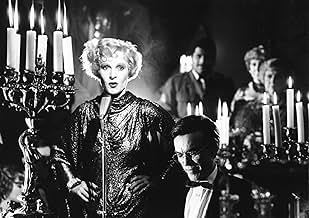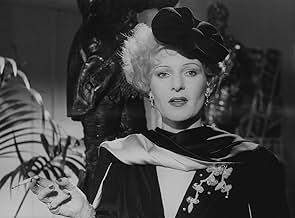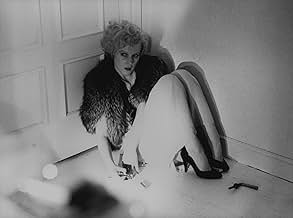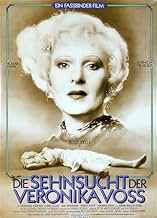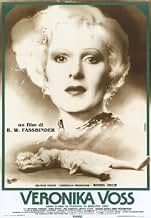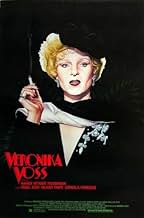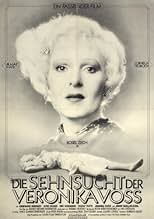CALIFICACIÓN DE IMDb
7.6/10
8.1 k
TU CALIFICACIÓN
La vida de Sybille Schmitz, que alcanzó la fama bajo el régimen nazi, pero cuya carrera quedó destruida después.La vida de Sybille Schmitz, que alcanzó la fama bajo el régimen nazi, pero cuya carrera quedó destruida después.La vida de Sybille Schmitz, que alcanzó la fama bajo el régimen nazi, pero cuya carrera quedó destruida después.
- Dirección
- Guionistas
- Elenco
- Premios
- 4 premios ganados y 4 nominaciones en total
Günther Kaufmann
- G.I.
- (as Günter Kaufmann)
- …
- Dirección
- Guionistas
- Todo el elenco y el equipo
- Producción, taquilla y más en IMDbPro
Opiniones destacadas
In a career spanning a mere sixteen years, Rainer Werner Fassbinder made forty-four films before his death at just thirty-six, which occurred a few months after the premiere of this, the final part of what has come to be designated as his BRD Trilogy.
It is beautifully written by his regular collaborators Peter Marthesheimer and Pea Froelich, shot in knife-like black and white by his preferred cinematographer Xavier Schwarzenberger and as one would expect from this director, features a strong leading role for an actress, in this case Rosel Zech, whose character is loosely based upon that of the fascinating but tragic Sybille Schmitz who despite never being fully accepted by Herr Goebbels and company found it virtually impossible to continue her post-war career because of her perceived Nazi connections and whose drug-fuelled downward spiral ended in suicide in 1955.
Zech is simply stupendous in a demanding role that requires a wide range of emotions and as a bonus she performs a beguiling, Dietrich-like rendition of 'Memories are made of this." As a lesbian Dr. Feel-good, there is a magnificently chilling performance by Annemarie Dueringer. The entire cast is uniformly excellent and all of the characters are well drawn. Armin Mueller-Stahl again makes his presence felt whilst the influence of America in the Germany of the time is epitomised by the sound track and not least by the presence of the ubiquitous African-American GI played as always by Guenter Kaufmann. As well as being a tribute to the mighty UFA Studios, the relationship between fading star Voss and the journalist of Hilmar Thate is a nod to 'Sunset Boulevard'.
There is an absence of socio-political comment here and the whole enterprise succeeds solely through the myths of the movies. Fassbinder was an avowed devotee of the dream factory that was Hollywood and professed his adoration for Douglas Sirk. As it happened the master long outlived the pupil and Sirk offered a fitting tribute:"Although his fims were controversial.....only those things that survive opposition have the power of permanence."
It is beautifully written by his regular collaborators Peter Marthesheimer and Pea Froelich, shot in knife-like black and white by his preferred cinematographer Xavier Schwarzenberger and as one would expect from this director, features a strong leading role for an actress, in this case Rosel Zech, whose character is loosely based upon that of the fascinating but tragic Sybille Schmitz who despite never being fully accepted by Herr Goebbels and company found it virtually impossible to continue her post-war career because of her perceived Nazi connections and whose drug-fuelled downward spiral ended in suicide in 1955.
Zech is simply stupendous in a demanding role that requires a wide range of emotions and as a bonus she performs a beguiling, Dietrich-like rendition of 'Memories are made of this." As a lesbian Dr. Feel-good, there is a magnificently chilling performance by Annemarie Dueringer. The entire cast is uniformly excellent and all of the characters are well drawn. Armin Mueller-Stahl again makes his presence felt whilst the influence of America in the Germany of the time is epitomised by the sound track and not least by the presence of the ubiquitous African-American GI played as always by Guenter Kaufmann. As well as being a tribute to the mighty UFA Studios, the relationship between fading star Voss and the journalist of Hilmar Thate is a nod to 'Sunset Boulevard'.
There is an absence of socio-political comment here and the whole enterprise succeeds solely through the myths of the movies. Fassbinder was an avowed devotee of the dream factory that was Hollywood and professed his adoration for Douglas Sirk. As it happened the master long outlived the pupil and Sirk offered a fitting tribute:"Although his fims were controversial.....only those things that survive opposition have the power of permanence."
This movie left me feeling rather low. Its world is quite bleak. People are either strong or weak in the face of a society that feels cold. Looks like being strong won't make any difference in the long run. A very sad tale with beautiful black and white photography.
In her own eyes,Veronika Voss is not really alive unless she retains her audience, unless she is loved and admired for her manufactured image. There are times in movies when Technicolor will not do, when the use of traditional black and white evokes evokes film noir, in this case referencing Billy Wilder's brilliant evisceration of and the pain of fading fame, Sunset Boulevard. The fine shadings of mood and atmosphere reflect the life led by Veronika under studio lights, just as the stark, unrelenting whites at her doctor's office blind her to reality during her visits for morphine injections.
Veronika Voss is based on the life of an actual German actress who rarely came alive unless under the lights, depicting a harsh and unrelenting life lived vicariously; it is a harsh look at a cruel existence increasingly dependent on addictive drugs to soften the hard knocks that come with the loss of fame and inability to face simultaneous aging process; it is a film worth repeated viewings.
Veronika Voss is based on the life of an actual German actress who rarely came alive unless under the lights, depicting a harsh and unrelenting life lived vicariously; it is a harsh look at a cruel existence increasingly dependent on addictive drugs to soften the hard knocks that come with the loss of fame and inability to face simultaneous aging process; it is a film worth repeated viewings.
10hasosch
Rainer Werner Fassbinder's second-but-last film does not show primarily the life and downfall of the UFA-star Sybille Schmitz, but gives, at the hand of the Schmitz-inspired, yet fictive character Veronika Voss an unvarnished and hopeless picture of the Bundesrepublik Germany in the 50ies. Part of Fassbinder's "BRD-Trilogy", it is also one of his 4 "women"-films, besides "Lola", "Maria Braun", and "Lili Marleen".
It is hard to say if the main focus of this movie is the former UFA-star Veronika Voss or the sports reporter Robert Krohn. One rainy night, he meets, in a little forest amidst of Berlin, a crying little bundle of mensch who seems to have completely lost her orientation. She is not so much thankful for his help but astonished that he does not recognize her: the great Veronika Voss. After he accompanies the woman to her door, she continues to occupy his mind. He asks his older colleagues who confirm him that she was once a movies' super-star, but now forgotten, divorced, impoverished, addicted and out of work. Soon, they meet again, and between Krohn, who is in a steady liaison, and Veronika, who sees in him one of her once many admirers, a very problematic love story starts which costs two humans' lives, leaves an investigative mind back in despair, discloses the corruption between medicine and politics and portrays the deterrent situation in the post-war German film industry which used his former flagships as fuel.
R.W. Fassbinder got for this films the "Golden Bear" out of the hand of Jimmy Stewart who was his friend for many years. Fassbinder had been nominated for the highest German film price since a long time, but it was Stewart who realized that soon it might come too late. Fassbinder passed away only a few days after having received the Golden Bear.
It is hard to say if the main focus of this movie is the former UFA-star Veronika Voss or the sports reporter Robert Krohn. One rainy night, he meets, in a little forest amidst of Berlin, a crying little bundle of mensch who seems to have completely lost her orientation. She is not so much thankful for his help but astonished that he does not recognize her: the great Veronika Voss. After he accompanies the woman to her door, she continues to occupy his mind. He asks his older colleagues who confirm him that she was once a movies' super-star, but now forgotten, divorced, impoverished, addicted and out of work. Soon, they meet again, and between Krohn, who is in a steady liaison, and Veronika, who sees in him one of her once many admirers, a very problematic love story starts which costs two humans' lives, leaves an investigative mind back in despair, discloses the corruption between medicine and politics and portrays the deterrent situation in the post-war German film industry which used his former flagships as fuel.
R.W. Fassbinder got for this films the "Golden Bear" out of the hand of Jimmy Stewart who was his friend for many years. Fassbinder had been nominated for the highest German film price since a long time, but it was Stewart who realized that soon it might come too late. Fassbinder passed away only a few days after having received the Golden Bear.
Like many other Fassbinder films "Die Sehnsucht der Veronika Voss" tells about a decline and is very depressing. It is a visually stunning film that shows how much Fassbinder admired the classical Hollywood cinema and especially the films of Douglas Sirk. Like the films of his idol this film is stylish and artificial to an extreme extent which creates quite a distance between itself and the audience. Probably an even greater distance, since the style and the artificiality are used more consciously here, even as a instrument of alienation. So it is more fascinating than touching or even moving and might leave one even cold. Nevertheless the story is intriguing and it really tells something about the post war society in West Germany, so the film is interesting and even fascinating to watch. The scene where Rosel Zech as Veronika sings "Memories Are Made Of This" is very haunting, a gem.
¿Sabías que…?
- TriviaBased on the true story of German film star Sybille Schmitz.
- ErroresThe film is set in 1955 but the song "The Battle of New Orleans" by Johnny Horton, released in 1959, is heard on the radio a number of times.
- Citas
Dr. Marianne Katz: Artists are different from ordinary people. They are wrapped up in themselves, or simply forgetful.
Selecciones populares
Inicia sesión para calificar y agrega a la lista de videos para obtener recomendaciones personalizadas
- How long is Veronika Voss?Con tecnología de Alexa
Detalles
- Fecha de lanzamiento
- País de origen
- Idiomas
- También se conoce como
- Veronika Voss
- Locaciones de filmación
- Productoras
- Ver más créditos de la compañía en IMDbPro
Taquilla
- Presupuesto
- DEM 2,600,000 (estimado)
- Total en EE. UU. y Canadá
- USD 8,144
- Fin de semana de estreno en EE. UU. y Canadá
- USD 11,623
- 16 feb 2003
- Total a nivel mundial
- USD 8,158
- Tiempo de ejecución1 hora 44 minutos
- Color
- Mezcla de sonido
- Relación de aspecto
- 1.66 : 1
Contribuir a esta página
Sugiere una edición o agrega el contenido que falta

Principales brechas de datos
By what name was Die Sehnsucht der Veronika Voss (1982) officially released in India in English?
Responda
